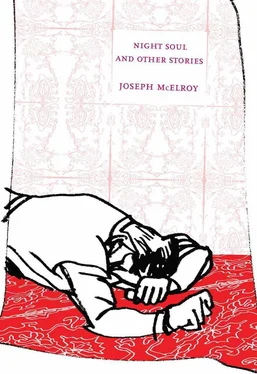Vic will lose the argument with his cool arriving to take the woman’s hand as Flyte took his beer with him and tossed back over his fat shoulder, “We heard that number — been there, done that. You don’t quit when you’re ahead. Your kid knows.” For others to hear still happy with the music, the trio, the evening. But personalities are always good to get into in this day and age no matter what the work was saying and Vic felt a strange audience and for just a second or two shares a blessed smile with the woman who has something to say to him but he has to go after Flyte, though then he heard his name called by Bianca as he’s out the street door and another voice.
Across the street the horn-player Flyte slid into his convertible. This itself seems to start the power roof, same old Chrysler. Pale canvas top risen reptilian against a wind-blown rain shower from the City. A cry of tires, headlamps swung right, then left but here sprung out of a tight space the car finds the narrow street when Vic steps off the curb slinging his arm like a send-off and slapping the rear fender to his surprise, safe by an inch, his onetime rival always present no more than what waits in the mostly potential trouble of the City. Yet the chassis wrenched into a skid braked backward to frame in the open window the driver’s face so you’ve forgotten the worst thought of all till the insulting words, “That’s a great kid. You don’t deserve him.”
Vic has already reached for Flyte for it was bound to be the wrong joke, and fists a handful of lapel and the door comes with him because Flyte, hand on handle, won’t be drug through the window. Let go, Flyte trying to stand up gets cuffed into the door frame. Then backhanded somehow back into the seat, cheek raked, banging his head on the door frame, he keeps talking, “You had a gig, look out it doesn’t get around.”
Convertible’s tail-lights gone down the street. Vic’s through with stories, not that there’s only music, though voices could help all alone. It is his son’s calling from the lighted double-doors of Lou’s Corner, which is not a corner and lacks any Lou anyone ever knew of. The boy was standing there and with him Bianca with all that make-up. Where can Lang have been? And now the Coastline woman.
“Who was that?” the boy said, looking back at the women on the sidewalk; “she knew you.” “She came the other night,” said the father, telling the cab driver where they’re going—“unknown to me,” Lang believes him. It’s not back to French’s tonight for Lang, but home, his call. He’d been in the Men’s Room, so Vic hadn’t seen him. “Bill Flyte hit it off with French, I guess,” said Lang. “So?” “One night was enough.” Tired, maybe gloomy, “He said he got you the gig,” said Lang to the window. “You hammered him.”
“’Fraid so. He was at a disadvantage. Especially him.”
“I know.”
Man makes a sound. “I was mad.”
What could the boy mean, I know ?
“He try to run you down?” “You know he didn’t.” “He’s got a convertible.” “Anyway never open the door unless you know who it is.” “What was the number they asked you for once and didn’t know they just heard it?” “A Horace Silver oldie.” The boy knew it. Waking up a little describing the movie Tommy , watched Friday with French’s mom, who couldn’t stop talking. Did Lang take music lessons? Was Lang’s Mom at Parent-Teacher? Ever met Billy Joel’s daughter? Lang’s mom know Roger Daltrey? Her photographs were of movie people. French’s mom met Ray Manzarek once and he was surprisingly nice. Did Lang’s mother go to the West Coast a lot?
The cab has pulled over. “She phoned,” Vic adds. They know who they mean.
“I got back to her,” the father guards whatever he has won.
The man has scanned the bookcase. He’s fouled his nails on Flyte as Flyte would foul your family.
Lang’s still got his clothes on under the covers. Yet he almost won’t drop off. “Did I read what she sent, what did I think of—”
“ Confessions I hear,” the man cuts in too quick.
“The science,” Lang continues methodically, battery low. “The story’s one thing, the…” the boy made that little funny thinking sound of his.
“The science?”
“There was a vibraphone player in it who used to get mad.” Lang made his little sound, funny.
“In her…?”
“That’s when I kinda quit. She’s away this weekend.” The man was waiting.
“I mean how’re you gonna prove it?”
“True?”
“No, T.P. said they’re so small they’re like light years…a string.”
— he’s been meaning to bring up their three nights years ago, twelve years ago, Lang so newly named, sounds he heard coming from the crib three nights running. “Dad? See…string vibration isn’t a tone or anything. It’s…Dad?”
“So what did you tell her?”
“It’s not a hum or music or — at least I don’t think it is.”
“What is it?”
“A particle, each vibration, a particle is all I know. Infinitesimal literally.”
“Infinitesimal literally,” Dad makes a contribution.
“Some open, some closed, but they’re so small they’re light-years away.”
“But here at the same time.” “In matter. She tells it like it’s…vibes or something.” “Well, it’s amazing.” “What?”
The man didn’t know.
It was not a good theory anyhow.
T.P. said.
“But it brings all the forces together.”
It’s way past even the idea of bedtime.
“What did you tell her?”
“…Good?…T.P.’s maybe going to teach architecture in a junior math class if they give him the job. He drew these arrows on the board. Vectors (?).”
“Vector, yes.” “A force between—”
“ Vector—” the boy, sleepy, liked the syllables—“the root idea…”
“Of what?” A sympathy between them. Tuned, with one dropping off.
“…Night, Vic.”
It will hang like the friend’s lunchtime question and its branches how many sleepless nights, this first name: a first for father, yet for some secret Vic the pianist too.
The man can see he’s missed his chance to bring up those sounds from the crib one night out in the country far from here very late, when he got up and went and listened and the baby was asleep or awake or in between. By the third night the man had learned the sounds— eh, ih… which finds a dee , and then a lah. Sounds attaching themselves. A nursing baby in its crib.
You wanted to know what this creature knew.
Then the sounds maddeningly changed. To ones he didn’t know at all. Twelve years ago. Lang is asleep. The question What would be the worst thing asks itself, now free of the passion and truth of work, for every night gets late: will the boy have to go and live with his mother? Like a difference between two parties that is the agreement. Is it the worst? And was it she who dropped by yesterday to more than borrow the photo album? That was it.
The first night, the man woke to a string of sounds, expelled, quite awful stabs of voice throat-rasped, deliberate, from the crib across the room. So that for a time he felt the person there to be his equal, and he feared for him. In trouble over there, in a small, accurate way the infant is possessed and on his own, and maybe the man can’t help his son, maybe he can’t do anything about it. It is even part of him out of control.
A shallow-sleeping family man who will wake in the middle of the night anyway, he woke to the woman breathing next to him, and to the room in the desert, his eyes opening on the window at the foot of the bed, where the screen was ripped, burst, jagged as a wave with an infinitesimal fire — like steel or flesh — telling him something has gotten in here, an animal, a hand. While the terrible sounds from the crib across the room— ah, ih, uh, eh —choked-out, cut-off, not asking for anything, were vowels, he realized. As if this is what you do waking alone: you speak, even if you are not talking yet; for anyhow the room is awake. So that getting out of bed beside the breathing of his wife, he would make a noise the baby would hear — who would want his company, or hers. But these vowels uncannily at work, the child is choking or being taken away or accosting whatever it is, so what’s his father doing here in bed? what is he waiting for?
Читать дальше











